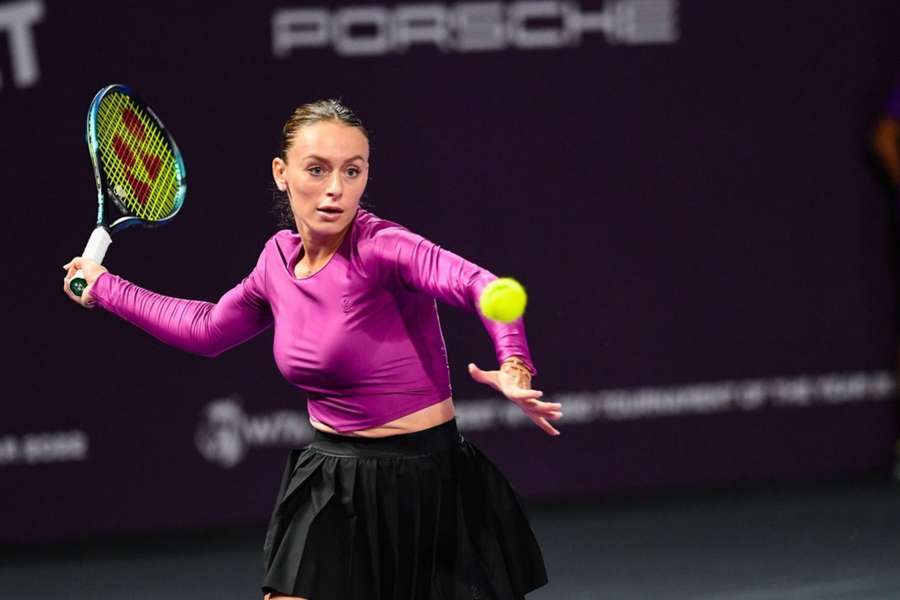Although it was her day off after qualifying for the second round (she would later win that match) at the Transylvania Open, Bogdan had a practice session, which she decided to extend because the court was free. She then continued with a meet and greet with fans, after which she agreed to an exclusive chat with Flashscore.
The day before her second-round match at her favourite tournament, Bogdan spoke about the challenges she faced early in her career when she had to take a 2-year break due to injury.
From being ranked 2nd in the world in juniors, she found herself without a contract and having to start over. Currently ranked 73rd by WTA, Ana Bogdan reached a career-best ranking of 39 this year and played the longest tie-break in Wimbledon history.
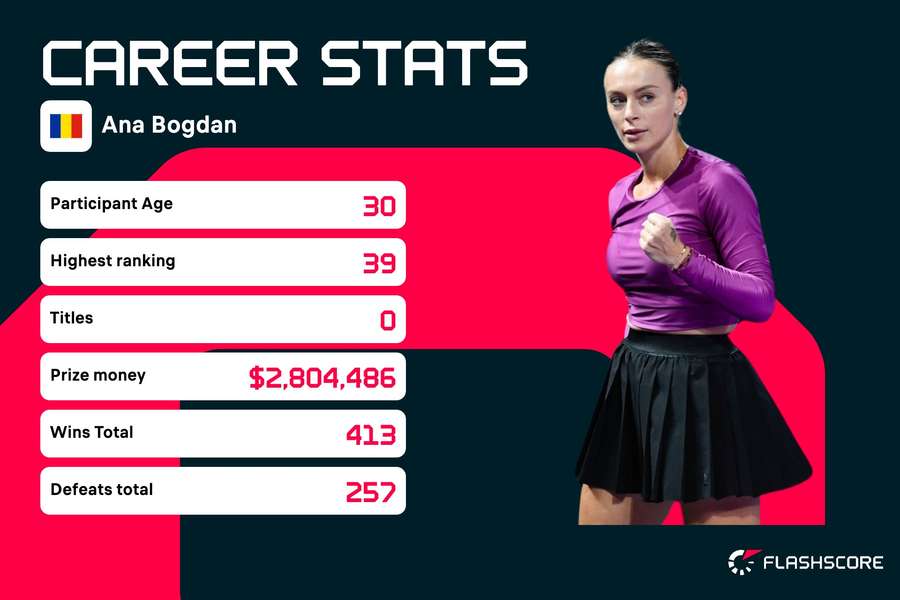
As a child, you skied and played tennis. What made you choose a career in tennis, given that your parents were skiers?
"The whole family skied, from grandparents and great-grandparents. At one point there was a year when it didn't snow much and we didn't have snow and practice conditions. That's when my parents decided I should try to play more tennis. It wasn't something set in stone.
"They said let's try to play more tennis because you can play it indoors, outdoors, in all seasons. Once I started playing more tennis I realised I liked it and I would like to do more of it and it turned into performing well."
Do you continue to ski today?
"Yes. It's my favourite sport and I really wish I could do it all year round. At least up there on the mountain, I can enjoy skiing, what I feel when I go skiing - freedom, joy and the feeling that I belong there."
Are there similarities between skiing and tennis?
"I would say yes. What I was told when I was younger, when you enter the turn you stay in a lower position and when you come out of it you have to get up.
"It's kind of like that in tennis, you have to stay lower on your feet, but when you finish the shot you go up with it and push off your feet. That's pretty much what skiing was like.
"Of course, it differs, it's a much more explosive sport skiing. Tennis is combined: speed, reaction, endurance, you have more work to do in tennis (laughs)."
If you could choose between tennis and skiing, which would you want to perform at?
"Tough question. I think tennis has brought me, and would have brought me even then if I had started it as a child, these huge rewards and I'm very grateful to tennis for everything I have in my life right now.
"Maybe if I had been skiing, especially in Romania, it would have been much harder for me. The costs at the time would have been much higher. It's hard to ski in Romania and you have to go abroad to train.
"I think I would choose tennis."
What difficulties did you face in your transition from junior to professional tennis?
"I went through quite a difficult period at the time in terms of injuries. It was a difficult period for me between 17-19 because I got injured and lost all the contracts I had.
"All the opportunities that I had created for myself as a junior, being world number two, kind of went away during that period.
"It wasn't an easy, smooth transition like maybe it was for other girls. I had a lot of work to do and learned a lot from that period."
'My parents were very supportive and kept me going'
How did you manage to get over this career hump?
"First of all, I took care of my health and started going on tour. I was unranked and went to tournaments (formerly: 'ITF $10,000') in Antalya because they were in the same place and the costs were lower than if I had travelled from one part of the world to another.
"I know very well that my parents were going through a difficult time financially.
"I was staying there, playing qualifiers, getting no points, no money. I would get through the qualifiers (3-4 matches), get into the draw and I was already tired compared to those who were going straight in and I had a lot of work to do.
"After a month or so of working there, seeing that I was getting neither points nor money, it seemed to me that all my work was in vain. I returned home disappointed. I told my mother that I didn't think there was any point in continuing if I didn't make it through, but I was very lucky with my parents for supporting me with all their might and making me go on.
"That was a very hard time for me and it was only after a few months that I started winning those tournaments, and earning money and points and moving up the rankings to go to bigger tournaments."
In the third round at Wimbledon, you played the longest tie-break in history. Was that one of the toughest matches of your career?
"Yes, I can say it was because it had a certain importance. It would have been the first time in my career that I played in the fourth round at a Grand Slam. I also had match point, it was all the more painful and it lasted a very long time (three hours, 40 minutes).
"As much as it hurt, I managed to get through it and motivate myself for the next day because I had to play doubles. I had to recover and do my best to be fit to play the next day.
"I think that helped me to get over that defeat a little bit easier and realize that there is a second day, a second chance. There is tomorrow, which is a new day. You start from scratch and you can create something again.
"That's when I realised that I start from the beginning, move forward, train both physically and mentally, and try to learn something from that experience."
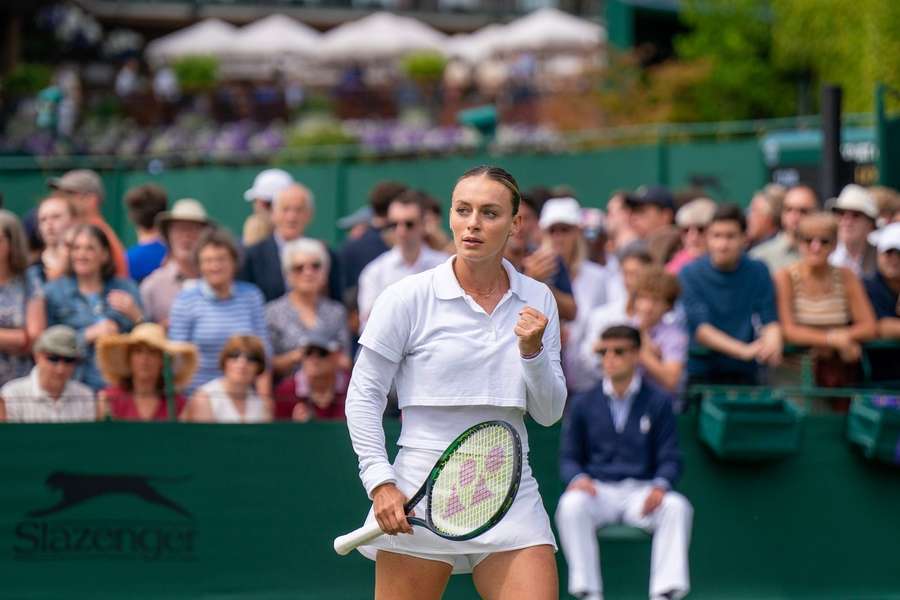
If you could change the fate of one match you've played so far, what would it be and why?
"(laughs) I think this would be it. It really meant a lot in this match and it went down to one ball."
'When I lost a match, it was tragic'
How do you get over a loss and motivate yourself to start over in a new tournament after just a few days?
"Honestly, it also matters a lot what people you have with you in those moments because it's very important to hear and receive some positive words after a defeat. Not to look at that match as a tragedy, as the end of the world.
"Me, for example, when I was 20-21 years old, even up to 25 years old when I lost a match, it was tragic (laughs). I suffered a lot, I was really upset by it. On the one hand, it's normal to care, but not to go to the other side, into drama.
"Tennis gives you that chance, to play another tournament, another match, next week. You have to be aware of this and think about what you have learned from this defeat, be grateful to your opponent because thanks to them you see where you need to improve and what you need to work on to become even better to win such matches that you lose and look with a lot of optimism at what lies ahead.
"To think that maybe next week your life changes with that result, I mean there is always still a chance. That's what I've learned over the last few years.
"It's very important to work on the mental side from a young age. Just as you train physically, tactically, and technically, you stay on the field or in the gym, so you have to work mentally.
"The sooner you do it, the easier it will be and it will be much better when you get to the seniors and have those matches with experienced players. I'm a big believer that mentality matters in those moments."
What is it like to play in front of your own fans and who are the closest people who support you from the stands?
"It's an extremely nice thing to play in front of your home crowd. Those emotions you get from the crowd can't be compared to anything else. Every time I play and the arena is full, I get goosebumps.
"When the game is over and I'm somewhere quiet, I'm reminded of those times when the crowd was supporting me and everyone was shouting. Those moments make you go further, make you dream of more, make you want to become a champion. Without the crowd, the sport you do wouldn't have the same value. The crowd matters a lot, and when I play at home even more so.
"Besides my coach and my team, my sister Ioana and my boyfriend Simone. They are the people that when I have them with me, I feel so happy and they give me so much energy that nothing around matters. I feel like I have extra energy, extra strength, because of them."
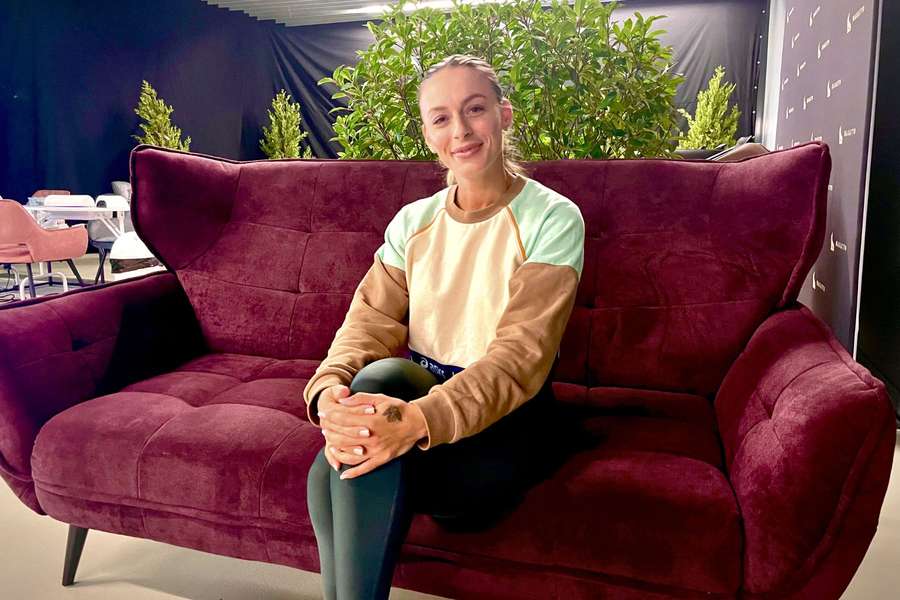
'You can get the crowd on your side'
How do you cope with a hostile crowd?
"It matters a lot when the crowd is with you because it makes it easier for you during the match. When they are against you, you have to focus only on yourself or somehow change the narrative and believe that they are supporting you. In your mind, you really have to have that power.
"You don't have to think that the crowd is against you and that drags you down. No, on the contrary. You can, through the joy of the game and the beauty of the game that you play, you can draw the crowd to your side."
Do you feel extra pressure when you play in front of your own supporters? If so, how do you cope?
"I think there is. With the experience I've gained I manage it much better. I used to be a bit more shy when I played at home in front of the crowd because I felt everyone had expectations of me.
"Now I try to focus on the things I can control - my attitude, my concentration, my shots, my game. I know that if I do that they will be happy at the end too."
This year you had the best ranking of your career (39th), you won again in Iasi and then in Parma. Do you think you are in the best period of your career?
"I would say it is one of the best periods of my career. I think last year too, somewhere after the US Open I had another good period where I played semi-finals in WTA 250 tournaments. I had matches that I won against Ajla Tomljanovic, who was coming from playing in the quarterfinals at the US Open against (Beatriz) Haddad Maia.
"We had FED Cup matches where we played incredibly well. I think this year I had periods. I had a great time at Wimbledon and before that, I tied some nice matches on grass, not my favourite surface.
"Iasi and Parma are very fond memories and make me want to do more, to win bigger tournaments."
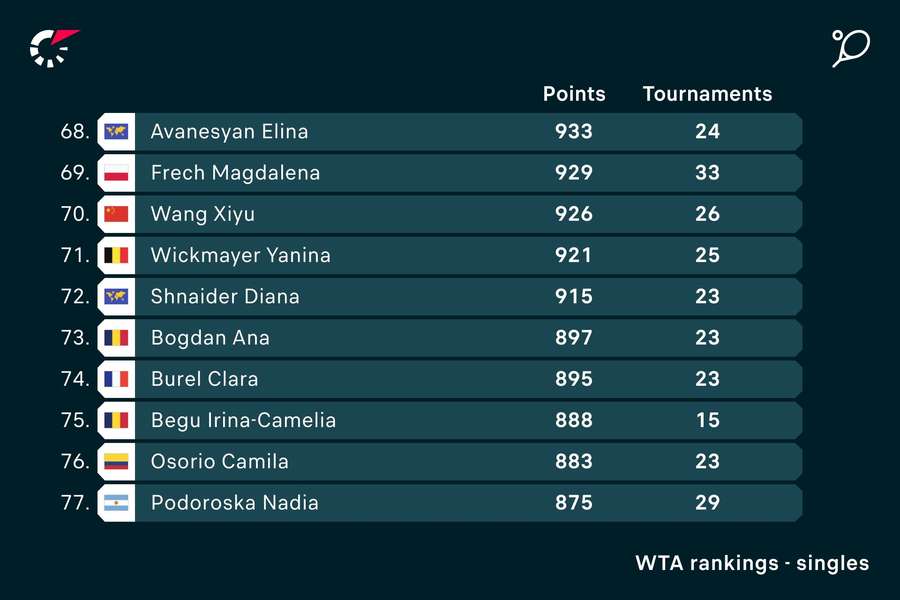
The last three tournaments you won were on clay. What is your favourite surface and why?
"(laughs) I think you have the answer already. Clay is my favourite surface because I find I can be a bit more creative there, vary my game more. I like that slipperiness that you have on the court."
What's it like to switch from clay to hard court?
"It's not that hard whereas going from clay to grass or vice versa, from my perspective, is the hardest."
'Always be positive and enjoy the game'
How would you describe your debut in Cluj and what do you think you need to win the tournament?
"I had a very nice and good match. I played with the desire to play nice and well. I focused on every single point regardless of the score. I think that's what I need to keep doing to be able to do well here.
"To focus on myself, on the things I can control, on my attitude, to always be positive and enjoy the game. That's what I always tell myself.
"Even in the first round match, I was telling myself almost every point, to play with joy, with the pleasure of playing tennis and doing this sport, no matter what happens.
"No matter what happens, no matter if I make a mistake or not. I think that's what matters most, being happy and at peace with what you're doing out there on the court. I hope to be able to do that every day at this tournament and make it a tournament with a happy ending."
How does Ana Bogdan spend a day off during a tournament?
"I definitely have to do training (laughs). There's no shortage of that. I try to take half a day off, either walking around that city, but not very much.
"To feel like I'm relaxing and unwinding, meaning that my mind isn't focused on tennis 100% and hour after hour. I give myself time to relax, to do things I enjoy and that recharge my energy. Obviously doing these things with people I love."
How do you prepare on match day, do you have any particular ritual or superstition?
"I would call it a routine. When I do those things every day, at the same pace and in the same order, somehow my mind sets up much faster and much easier for what I have to do on the court as well. Everything is more orderly, clearer in my mind.
"In the morning I do a meditation, I visualize how I would like that day to go and I also visualize moments from the game. I have breakfast, come to the court, about an hour and a half before so I have time to get things ready at my own pace. I get my racquets ready, hydrate really well, even the day before the match, warm up, go to practice and then get ready for the match.
"I also give myself a few good minutes of meditation and breathing exercises to feel that my mind is calm and peaceful before the match."
In the second round of the Transylvania Open, you will meet for the first time Nikola Bartunkova, only 17 years old. Are matches where you meet an opponent for the first time more difficult?
"For sure they are not easy, because you don't know how the ball is coming from the opponent, but I try as much as I can, I really try to focus on myself, on what I have to do, and on the ball, every ball.
"The focus should be on the ball, not on who is in front of me on the other side of the net. It makes a huge difference to do that because that's how you feel the shots better.
"When you take the focus to the other side, you lose timing, you lose focus and it's more difficult."
What is your favourite tournament?
"Transylvania Open."
What is your favourite grand slam tournament?
"Even though I'm not a grass court specialist, Wimbledon is my favourite tournament because it's very special. I'm glad they kept this tradition of everyone wearing white and that it's played on grass, obviously.
"It's very elegant and very special, that tournament. There's something special about it. You can't compare it and describe it in words as beautiful as it is."
Winning the Transylvania Open or the latter rounds at Wimbledon?
"Why not both? (laughs)"
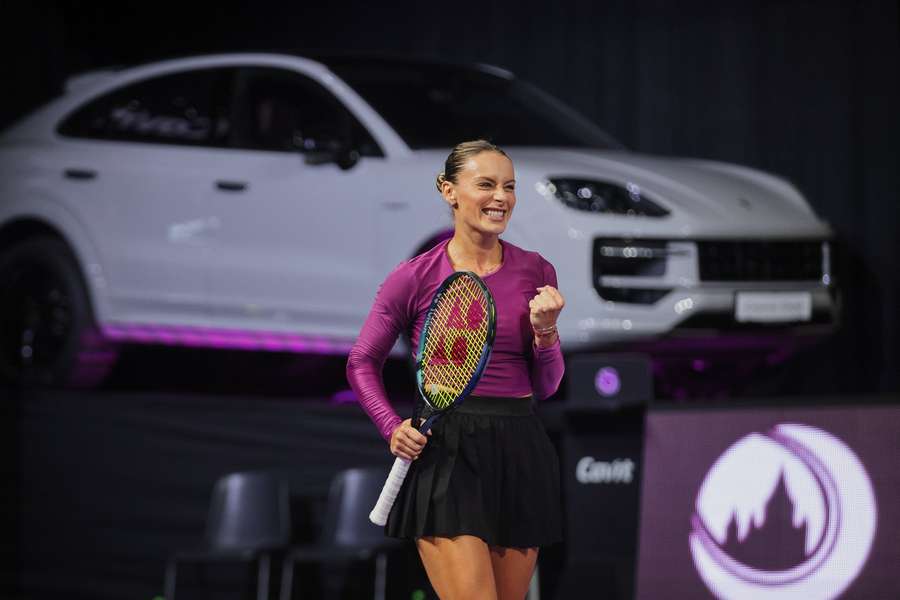
'Talk nicely to yourself'
Finally, what is your message to young aspiring tennis players? Is there a secret?
"What I've learned, especially in the last two years since I've been at this level, between 50-100th in the world - it's very important to work physically, tactically, technically, but also mentally.
"The mental is extremely important. I've learned that what you tell yourself during the match is very important. And even in training, because that's where the routine that you apply in matches comes from.
"Talking really nicely to yourself, being your friend. It's very important to be positive, to be optimistic and regardless of the score you still believe in yourself.
"A tennis match is not over when the opponent is 5-2 up and has three match points. And from there you still have a chance to come back and win the match.
"Always, I believe until the last moment, when I go and shake hands with my opponent. That's when I know a tennis match is over.
"Enjoy doing what you do and enjoy what sport has to offer. Do it with passion and always believe in your dreams, in what you want, because anything is possible. Anything!"

